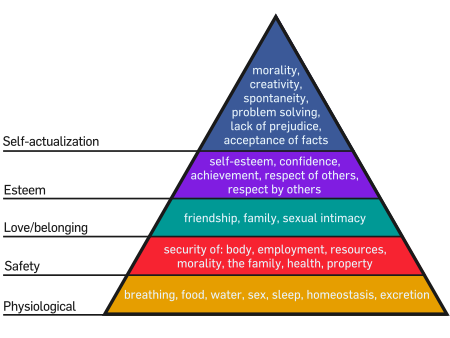
Listen to the this blog post:
I was talking to a friend of mine and she indicated that she was using some self-actualization techniques as part of her personal development.
That made me curious about where the self-actualization techniques she was learning had originated.
Self-actualization, is one of the highest levels of psychological development, where your personal potential is fully realized after your basic needs have been fulfilled and you have full control over your ego.
According to psychologist Abraham Maslow’s, (b.1908-d.1970) self-actualization is considered the pinnacle of human development.
Maslow developed a hierarchy of human needs as a psychological theory proposed in 1943, which suggests that human needs are arranged in a five-tier pyramid.
Maslow by Factoryjoe, CC BY-SA 3.0 https://creativecommons.org/licenses/by-sa/3.0, via Wikimedia Commons – Educational Fair Use
The five levels are from lowest-to-highest:
- Physiological Needs: Basic survival needs like food, water, sex, and shelter.
- Safety Needs: Security, stability, and protection from harm.
- Love and Belongingness Needs: Social relationships, affection, and being part of a group.
- Esteem Needs: Self-respect, recognition, and feeling valued.
- Self-Actualization: Achieving one’s full potential, self-fulfillment, and personal growth.
Characteristics of Self-Actualized People
Maslow identified several characteristics common among self-actualized individuals including:
- Creativity: They exhibit creativity and innovation in their thinking and problem-solving.
- Acceptance: They accept themselves, others, and the natural world as they are.
- Problem-Solving: They approach life’s challenges with a problem-solving orientation.
- Autonomy: They are independent and self-sufficient, relying on their inner values rather than external authorities.
- Authenticity: They are true to themselves, expressing their genuine thoughts and feelings.
- Peak Experiences: They often have profound moments of love, understanding, or happiness that stand out from everyday experiences.
As a psychological theory proposed in 1943, does self-actualization still have any relevance in today’s world?
The core principles of self-actualization DO remain applicable across various fields including life-coaching, psychology, education, business and healthcare and in other fields.
Maslow’s hierarchy of needs continues to be a foundational theory in psychology and life-coaching. In the business world, Maslow’s hierarchy is used to understand employee and customer motivation. Educators use Maslow’s hierarchy to create supportive learning environments. In healthcare, Maslow’s hierarchy is used to address comprehensive patient care.
Achieving Self-Actualization
How do you achieve self-actualization?
- Know Yourself: You understand your strengths, weaknesses, values, boundaries and passions.
- Set Goals: You establish meaningful and challenging goals that align with your values.
- Seek Growth: You continuously seeking new experiences and learning opportunities.
- Embrace Change: You are open to the chaos of change and adaptable to new situations.
- Practice Mindfulness: You are present and fully engaged in each moment.
- Build Relationships: You form deep, meaningful relationships with others.
- Pursue Excellence: You are confident and pursue excellence in all situations and embrace lifelong learning.
In contemporary personal development, self-actualization is often discussed in the context of achieving a balanced and fulfilling life and living fully in the present moment.
Self-actualization involves integrating physical health, mental well-being, and personal passions to lead a life that feels both meaningful and satisfying.
Working on yourself to achieve self-actualization helps you to create a positive impact in your own life.
Out There on the Edge of Everything®…
Stephen Lesavich, PhD
Copyright © 2024, by Stephen Lesavich, PhD. All rights reserved.
Certified solution-focused life coach and experienced business coach.
![]()









Add comment